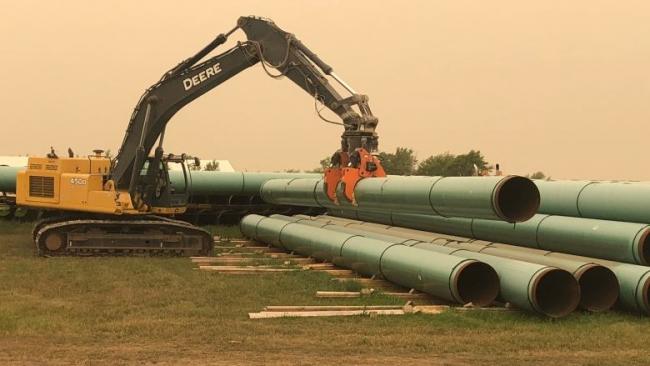Articles Menu

Dozens of kilometres from where a protest camp has been set up, Enbridge revelled in the construction of its massive and controversial pipeline replacement project in Manitoba.
On Thursday, Enbridge invited reporters and politicians, including federal Natural Resources Minister Amarjeet Sohi, to a site near Morden to show off the construction of its line which its punches its way through the province this summer.
The controversial project replaces just over 1,000 kilometres of existing pipe running from Hardisty, Alta., to the U.S. border near Gretna, Man., carrying crude oil to refineries in the United States.
It's been described as one of the largest infrastructure projects in the country.
Enbridge says the project will pump nearly $400 million into Manitoba's economy, and is providing nearly 3,800 jobs for workers in the province.
"Building this pipeline will reassure investors that Canada is a country where big, important things get done," Sohi said.

Sohi said the Liberal government took the "most inclusive approach" by consulting Indigenous leaders throughout the approval process.
A key supporter of the project is chief Ken Chalmers of Birdtail Sioux First Nation near Virden.
He told reporters the pipeline replacement meant nearly two dozen jobs for his community through contracts with Enbridge, and approximately $2 million in direct economic benefits to his First Nation.
He acknowledges the need to convert technology and energy use to more environmentally friendly sources, but says present demands have to be met first.
"We are consuming more oil than ever and the population is growing, and we need to keep Canada's economy for what we are facing at the First Nations level," Chalmers said. "The governments need that money to invest in their communities."

Geraldine McManus, a Dakota two-spirit person at the protest camp, says Enbridge's money and jobs are fleeting, but their Indigenous communities will remain, struggling.
"The money is not long-term, but these scars, these lines, they're trying to make it long-term."
Spirit of the Buffalo, which is organizing the camp, is demanding that Enbridge stop building the oil pipeline because it claims the company does not have free, prior and informed consent of all Indigenous peoples along the route.
McManus was standing Thursday some 40 kilometres southeast of Morden, near Gretna, where the pipeline crosses into the U.S.
"This is Crown land I'm on. Don't force me to do something on my own land that you've been doing to us for hundreds of years here. I have the right to be here, you don't have the right to be here, Enbridge, and yet you are."
With files from Ian Froese
[Top photo: Enbridge hosted a pipeline construction tour in Morden on Thursday. (Sean Kavanagh/ CBC)]